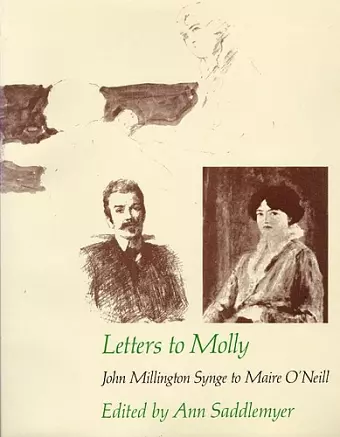Letters to Molly
John Millington Synge to Maire O’Neill, 1906–1909
John Millington Synge author Ann Saddlemyer editor
Format:Paperback
Publisher:Harvard University Press
Published:14th Apr '84
Currently unavailable, and unfortunately no date known when it will be back

When John Millington Synge and Molly Allgood fell in love, he was thirty-five, she nineteen. Neither knew that he had Hodgkin’s disease, of which he was to die in three years. Synge had already achieved recognition as a playwright—translations of two of his plays had been performed in Berlin and Prague—and he was codirector, with Yeats and Lady Gregory, of the Irish National Theatre Society. Allgood had started her acting career the year before, in the newly opened Abbey Theatre, with a walk-on part in Synge’s Well of the Saints. She had been promoted from crowd scenes to bit parts to lead roles in Riders to the Sea and The Shadow of the Glen. She was still only a member of the company, however, while Synge was a director, whose codirectors disapproved of fraternization. Synge and Allgood also faced the disapproval of two widowed mothers. Barring an occasional holiday trip or company road tour, they could seldom be alone together, except on secret afternoon meetings for long walks in the country. Hence their hundreds of letters.
Molly Allgood’s letters do not survive; they apparently were destroyed when Synge died. But his letters convey her mercurial charm, her openness, her love of life, her impulsiveness, and her temper—as violent as his own. What they convey of him (when he is not reproving her or remonstrating with her, as he does in the early months of their relationship) is the love of nature, the poetic language, the bittersweet irony, the elemental quality of emotion, that we know from the plays. His concern for his craft is seen as he struggles with The Playboy. (“Parts of it are not structurally strong or good. I have been all this time trying to get over weak situations by strong writing, but now I find it won’t do, and I am at my wit’s end.”) Synge was quite unperturbed by the violent outrage and near-riots the play provoked. (“Now we’ll be talked about. We’re an event in the history of the Irish stage,” he wrote cheerily.)
As his illness progresses, following operations in 1907 and 1908, there is great poignancy in the gradual abating of references to marriage plans and in the shift of salutation from “Dearest Changeling” to...
A book one is reluctant to put down…[it is] compulsive reading because of its enigmas, the ever-varying rapport between this aloof Director of the Abbey Theatre…and the young ‘changeling’ of an actress… In a sense Molly was the co-author of The Playboy and Deirdre, since so much of her real and fancied spirit was written into the heroines she later presented on the stage, and because of the life-giving turbulence with which she recharged him. -- Norman MacKenzie * Queen’s Quarterly *
[The letters] begin on a querulous note, turn to passion, to tenderness, to pathos, but in the end show us pretty much the whole man, who for genius ranks next to the man who befriended him, W. B. Yeats, and put him on the road to immortality. -- Herbert Kenny * Boston Globe *
This is a book to buy and to keep and to lend to no one: it is a very private and personal thing and too deeply moving, too heart-breakingly gauche, too clumsily painful to be shared. -- Robin Skelton * Malahat Review *
ISBN: 9780674528338
Dimensions: unknown
Weight: 771g
368 pages